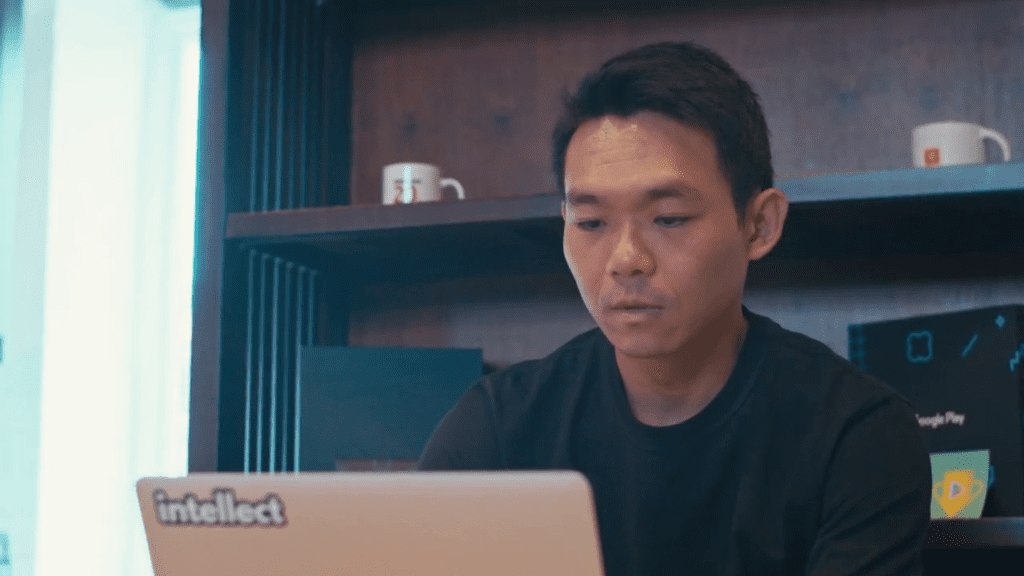Mental health challenges heralded by the pandemic need no introduction.
At home, we were deprived of personal space and overcome with paranoia for vulnerable family members. At work, we never saw colleagues anymore. Welcome lunches and farewell dinners were reduced to brief, virtual interactions on Zoom.
For some, job insecurity and instability crept in. In 2021, 9 in 10 Singaporeans reported a decline in mental health.
Against a backdrop of global recession, employee mental health in the workplace can sometimes take a back seat as employers strive to protect jobs. Where HR teams had their hands full with split-team arrangements and the great resignation, managers often stepped up to do the latter.
This was no different for Tech In Asia, Asia’s largest technology media company, before they adopted Intellect.
Managers—a substitute for counsellors?

“We really relied on our managers to regularly reach out to our team members,” says the company’s CEO and founder Willis Wee. “During our one-on-ones, we don’t just talk about work but also about life. That was useful in a face-to-face context, and was pretty much the only assistance we provided for our team members.”
When managers recognise team members not just for their roles but also for their humanity, they help the latter feel seen. But while this first line of defence is well-meaning, managers risk burnout when they double up as “counsellors”.
More importantly, they are seldom equipped with the skills and knowledge to do so.
Through regular culture surveys, these cracks quickly became clear to Willis. His employees started requesting third-party experts, such as coaches, to help them work through personal struggles. A perfectly reasonable preference, given that employees are often hesitant to tell managers how they’re really doing for fear of jeopardising their careers.
A 2021 Mercer Report revealed 61% of employees trust their employers to look after their wellbeing. That was exactly what Tech In Asia did, and the search for a modern mental healthcare solution eventually led Willis to Intellect.
Customised care for individual employees

According to Willis, it was the ease of usage and personalised experience that checked his boxes:
“The first [thing that stands out] is that Intellect offers very easy onboarding where they can select from several big themes for self-help. The second thing is that if you can’t find something that suits you under the self-help sessions, you can actually look for a coach. Under the coach, you can see what the coach specialises in. That really helps in terms of finding the right person to connect with.”
Research has proven that the relationship between a therapist and their client is the single greatest determinant of success. In the same vein, the right coach or counsellor can make a world of difference. On Intellect, Tech In Asia employees are free to seek out the right fit because, as Willis rightly pointed out, there is no penalty for trying out or cancellations.
He adds that this flexibility “helps to bring down the discomfort of engaging and talking to a coach.”
How managers can lead by example

An idea is only as good as its implementation, and this is where most companies fall short.
Even though more than half of organisations surveyed by Gartner put out a new wellbeing offering in 2020, and close to 90% of employees have access to mental health resources, only 23% use them.
Tech in Asia’s answer to this? Leading by example.
“The reason why there is such a high engagement rate is mainly that leaders lead by example. It’s really action influencing action,” explains Willis. “Their feedback encourages people to take action and have their own view of how Intellect can help them.”
As the company’s leader, Willis walked the talk and wound up being a super user. Even in his town halls, he would candidly share learnings from his coach, Xiao Ling:
“I constantly tell people about my experience on Intellect and that really helps them to feel that, hey, if Willis is using Intellect, it’s okay that I use it as well. There’s no judgement. There’s no fear of being tracked. Or (the implication) that if you use it, you have a problem.”
When managers led by example, he says, word-of-mouth triggered a virtuous cycle within the organisation and employees felt more at ease about asking for help.
How Intellect’s experts helped employees

1. Coaching advice
Even though employees see coaches and psychologists in private, Tech In Asia’s culture of sharing has helped to augment successful outcomes arising from these sessions.
In coaching, an employee who struggled to get tasks done amid endless video calls learnt to indicate periods of unavailability where he would be engaged in deep work on his calendar. What started as a simple suggestion was later picked up by other team members and Willis himself.
“I’ve also benefited from this advice,” he says, “and it shows how one piece of advice from a coach can really cut through the organisation and help leaders and team members.”
2. Self-guided sessions
Apart from coaching, Intellect also offers self-guided sessions which are clinically validated and based on Cognitive Behavioural Therapy.
When we spoke to Tech In Asia’s director of marketing Amanda Yesionwski, she had already gone through four of such sessions and planned to complete the full course. At the start, the self-professed “serial app downloader” didn’t think it would be a great tool because she thought the content was not rocket science.
“You would think people will know these things,” says Amanda, “Like how do you recognise when you’re anxious? But I think anyone who has been anxious will know that when you’re in it, it’s so hard to identify which way is up.”
For Amanda, Intellect is a means of remaining cognisant of what she’s experiencing throughout the day, and has gradually become a ritual at the end of it.
3. A conversation starter
With Intellect, Tech In Asia didn’t just offer their employees resources. They also got everyone on the same page regarding personal and professional development, which in turn strengthened a workplace culture of mutual care and concern.
Amanda explains that “giving everybody a common denominator to be working with, in their own way and their own time, has really opened people up to talk about how they’re doing.” This has allowed employees to venture beyond superficial small talk and check in on their mental wellbeing.
“Throughout the day, we are all a little bit more mindful about how we should be treating each other and ourselves as people,” says Amanda.
Aligning company values with mental health policies

A mental health initiative can only take off with a complementary organisational culture. Values are often thrown around in employer branding, but actions speak louder than the words in a company’s LinkedIn bio. What is the key to getting it right, then?
“Start from the policy,” Willis advises. “If you really mean it, put it into action and trust that you’ve got the best people in the organisation to bring out the values.”
For example, companies that tout flexible working cultures cannot remain rigid about leave allowances, office hours, and work locations. Where there is dissonance between values and policies, it may not be the best climate to introduce a new mental health solution.
Willis’s advice to employers who are looking to adopt Intellect: be clear of your agenda.
He adds that “if the agenda is just to tell shareholders or stakeholders and check the checkbox, that’s the wrong approach.”
How TIA managers practised transparency and candour

Beyond policy, these values have to be imbued in day-to-day interactions as well. Since Tech In Asia prides itself on transparency, even the CEO’s ideas are open to being challenged. That’s where their best ideas originate.
“If I’m wrong, then I need to really stand up and admit that this is a really good debate,” says Willis. “You are right, I stand corrected, and we move on. Without burning any bridges or the person feeling threatened that they had angered me in that sense.”
To promote psychological safety, managers at Tech In Asia are also encouraged to voice out what they truly think or feel to team members. Sometimes, this involves being vulnerable with them.
“Leaders are humans after all,” says Willis, “When we are feeling down, it is actually quite telling from our body language and facial expressions even through a Zoom call. Sometimes it’s more human to talk through the problems you are facing, and you would actually be surprised that the person truly understands where you are coming from.”
At times, this openness and candour could even inspire new solutions and perspectives that managers had not previously considered.
A holistic mental wellbeing solution
An Oracle survey in December 2021 showed that 77% of respondents felt that their companies were more concerned about employee wellbeing than in pre-pandemic times. Even then, employee assistance programs targeted at mental wellbeing can be hits or misses with little feedback given the nature of the topic.
While managers can help take care of their team members, companies have to recognise that they too are adapting to the new norm and can’t do it all.
At Tech In Asia, Intellect was introduced by managers who led by example to a community that already valued mental wellness. The combination of leadership, company culture, and a scalable solution helped them to achieve a 75% utilisation rate within 8 months.
Read their case study in detail here.








